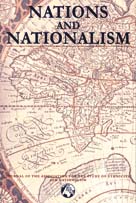Article contents
Masculinity and secessionism in Italy: an assessment
Published online by Cambridge University Press: 10 November 2000
Abstract
The masculinist rhetoric of the northern Italian separatist party, the Lega Nord, is an example of nationalist status affirmation. The stereotyped contrast between effeminate southerners and masculine northerners developed at the end of last century is used to affirm the superiority of the masculine North. The Lega's rhetoric parallels mainstream concerns on Italy's international status, and proposals for reforms to make Italy more ‘masculine’ and European. The use of a gendered language for the affirmation of national status reveals a belief in a normative hierarchy of nations, but also introduces a tension between a ‘masculinist’ status affirmation and a model of modernity which includes the emancipation of women as one of its principles.
- Type
- Research Article
- Information
- Copyright
- © 2000 Association for the Study of Ethnicity and Nationalism
- 4
- Cited by




